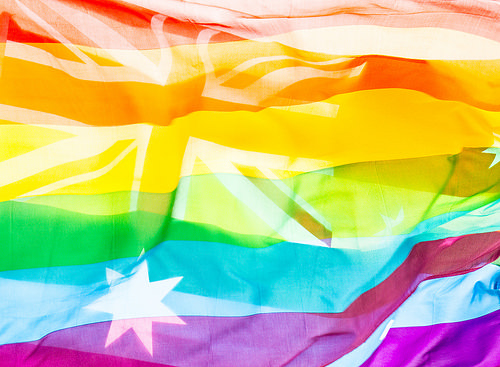From an anonymous contributor.
The answer to this one should be a piece of cake: the plebiscite on same-sex marriage should take place because Turnbull promised one if his side got re-elected, and his side did get re-elected. However, we Aussies are getting a bit too used to prime ministers making promises that they later break, so I fear that Turnbull might do the same on this. Here are five reasons that the plebiscite should happen.
 1. It’s already been decided in Parliament. Supporters of same-sex marriage keep on saying that the politicians should just vote on this once and for all. Sounds great, but they have voted on it, again and again. In fact, there have been 16 votes on same-sex marriage in the last decade and a half. But supporters of same-sex marriage have never accepted those decisions of parliament, so they kept trying for a yes. Former PM Tony Abbott proposed the plebiscite as a solution to this problem. If the people made the decision, then the matter could be settled properly. If the people voted against same-sex marriage, then supporters of it could give up campaigning for it, knowing for sure that the people had rejected it and that the change would not be welcomed. If the people did vote for same-sex marriage, then supporters of traditional marriage would have to accept that.
1. It’s already been decided in Parliament. Supporters of same-sex marriage keep on saying that the politicians should just vote on this once and for all. Sounds great, but they have voted on it, again and again. In fact, there have been 16 votes on same-sex marriage in the last decade and a half. But supporters of same-sex marriage have never accepted those decisions of parliament, so they kept trying for a yes. Former PM Tony Abbott proposed the plebiscite as a solution to this problem. If the people made the decision, then the matter could be settled properly. If the people voted against same-sex marriage, then supporters of it could give up campaigning for it, knowing for sure that the people had rejected it and that the change would not be welcomed. If the people did vote for same-sex marriage, then supporters of traditional marriage would have to accept that.
2. The people have a right to be asked. Same-sex marriage would be a huge change for our society. Usually, we don’t get asked our opinion on big matters that affect our country. Democracy mostly means giving the people a pencil every few years and asking them to indicate their preference for one out of two contenders. But same-sex marriage will have huge ramifications for this country. The percentage of traditional, nuclear families will immediately be smaller. The percentage of children growing up without one or both of their parents will increase, denied their mother or father not because of tragedy or wrongdoing, but because of an Act of Parliament. A whole new class of children will be begotten by means of sperm donors or surrogate mothers, children who will not be raised by a parent of each sex.
3. They are wrong about hate speech. The big argument that supporters of same-sex marriage are using right now is that Australians can’t be trusted to have a plebiscite because some of us might say things that gay people will find hurtful. I’ve even heard that the plebiscite might incite a suicide, which is an outrageous thing to say. How dare a threat of violence be used to stifle freedom of expression! How much different is, “Don’t talk, or I’ll kill you,” from, “Don’t talk, or he’ll kill him”?
Aside from that, I have two responses to the supporters of same-sex marriage about this issue. First, do you see a screed full of invective and anti-gay pejoratives here? No. Why is that? As it happens, I have had several good friends who were gay men. I’m not interested in hurting their feelings, or the feelings of anyone else. But gay marriage is a bad idea. If a gay man wants to commit to one partner forever, he can. If he wants to get married and father a child, giving that child its human right to its own mother and father, well, that’s going to be a bigger obstacle for him, but yes he can do that too. What he ought not to have the right to do is father a child whom he intends to take away from its mother. No government should support that. But that will be the result of same-sex marriage. A same-sex marriage won’t be ‘equal’ to a normal marriage if it can’t have kids, somehow.
Second, supporters of same-sex marriage simply ought to toughen up. If they are so sure that they are ‘on the right side of history’, then why not fight on, no matter what the odds? Isn’t that better?
Imagine this were a movie, and supporters of same-sex marriage were the hero. In this movie, the hero does not battle against the toughest odds, and fight on even when all hope seems lost, winning the applause of the audience, and the grudging respect of the antagonist. Instead, the hero says to the antagonist, “Getting into a conflict with you might hurt my friends’ feelings, so you should let me win without putting up a fight.” And then the antagonist does just that and the movie ends.
Come on, what kind of a crummy movie would that be then? What kind of ‘hero’ would that be? Imagine if The Karate Kid ended like that, or Star Wars. Everyone would hate it. Same-sex marriage supporters will find that they will be a lot more highly respected if they face up to their opposition with courage rather than wimp out.
Let’s call this one out: Supporters of same-sex marriage are using fear and even threats of violence to try to shut this discussion down and stop the plebiscite. They don’t respect the opinion of the Australian people, they don’t trust the Australian people, and are chickenhearted. None of those things are good.
4. Where did the call for same-sex marriage come from? I think most average people in this country have no idea where this issue sprang from. It seemed to come out of nowhere a few years ago.
Basically, it was born in the 19th century, in the anti-family aims of communism. Communism has always been anti-Church too, of course. You can read about the communists’ desire to abolish the family in their own Manifesto. After the Soviets intervened in Czechoslovakia in 1968, Soviet-style communism started to lose favour with Western communists, as well as seem less likely to happen in the West. The Marxist/communist movement in western countries – yep, the only ones where anyone seems to care strongly about same-sex marriage – started to move away from only being about class warfare, and began to incorporate feminism and the gay rights movement, as well as other areas like the anti-racism movement, drugs, the environment. All the topics the ABC likes talking about. This evolution in Marxism followed the ideas of the Italian Marxist Antonio Gramsci, and was called ‘Eurocommunism’ by some. By the ’90s, the Greens were in the ascendant. The call for same-sex marriage became gradually louder between the ’90s and ’00s, and then deafening in the ’10s, when political correctness, aka Cultural Marxism, is firmly the dominant value system in universities, the media and public services, and while church attendance is in decline.
Now, that is a very potted history, and obviously needs a more nuanced and exact retelling. But really, how many ordinary people know any of that? How many people think same-sex marriage is just something to do with letting people be free to love each other? Would ordinary people be so in favour of same-sex marriage if they knew about the Marxist connection? If we get a plebiscite, this kind of information will hopefully become more widely known.
5. Why exactly are they calling for same-sex marriage, rather than calling to abolish marriage altogether? I’d really like to hear the explanation for this, and the debates in the lead-up to the plebiscite may give us the answer. They can’t say it’s because they respect marriage; they don’t. They think it discriminates against gays and they want to change it. And they can’t say it’s because they want equality, because true equality would include polyamorous and polygamous relationships. Why are they excluded? Are they not equal? Who is anyone to say that if a marriage of two men is equal to the marriage of a man and a woman, somehow the marriage of a man and two women isn’t?
So what’s the reason for bringing in same-sex marriage? Is it because gays covet it? Surely that can’t be it. No government would use covetousness as a rationale for sweeping social change, surely.
Best guess: If marriage were officially abolished and the State had nothing more to do with it, only thenceforth recognising people’s cohabitation arrangements as they already do, then churches would still conduct marriages as one of their ordinary ceremonies and rituals; thus the church would not really be hurt, and married couples would still exist. And Biblical churches won’t marry two people of the same sex; only the State and non-Biblical churches will be willing to do that. I think the same-sex marriage movement’s aim is not equality but to diminish marriage, family and the Church. This fits in with its Marxist origins. Smarter minds than mine will be able to elaborate on that, or correct it, or both, but only if we get a chance to debate this properly in the lead-up to a plebiscite.
Conclusion. It seems to me that the issue of same-sex marriage is about five things, and tackling homophobia is not one of them: a) Children’s rights to their own parents; b) the relationship of parents to their children; c) the role of male and female parents; d) the esteem in which we as a society want to have for family; and e) the moral authority of the Church.
Are we going to disdain family, like the Marxists do? Or are we going to cherish it? Are we going to say that a child has a right to be raised by his or her own parents, or are we going to say that a child lacks that right? Are we going to say that a man and woman ought to raise their own begotten child, or are we going to say that they needn’t? Are we going to say that there is any difference between the way a man and a woman raise and relate to a child, as well as to each other, and that a child would do well to have both a male and a female parent? Or are we going to say that sex distinctions are meaningless now? Has same-sex marriage got anything to do with stripping the Church of its moral authority, or of the conflict of values between Christianity and Marxism? Are we going into this with our eyes wide open, knowing as many of the facts as we can and the likely outcomes, or is this debate being led by emotionalists who want to hide the facts from us, using fear tactics to deny us our opinions?
Come on. Let’s do the plebiscite. Let’s debate this. Ignore the fools and hang the expense. We need to sort this out properly.
Photo by pumpkinmook 










